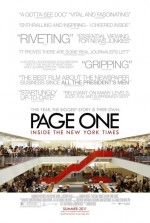Page One: Inside the New York Times

The fact that you’re reading this on a Website rather than in a newspaper or book somewhere should tell you, whether you realize it or not, the current state of flux in media. The newspaper, and the news business as we have known it, is dying. And no one knows what, or if, anything is going to replace it.
The nut graff, as any journalism professor will tell you, is essentially this: is investigative journalism important enough to the world that it needs to be preserved as it is, despite the marketplace trying to mutate it into something new?
Like the best investigative journalism, the topic of Page One: Inside the New York Times itself is something which is both serious and important, yet potentially all too easy to make so stultifying and dull that no one can put together enough will to pay attention to it. Fortunately, director Andrew Rossi (Le Cirque: A Table in Heaven) has taken a page from some of the yellowsheet barons who faced similar troubles once upon a time. He has wallpapered his subject with money, war, hints of sex, and some very real (if grizzled) charm. The result is a documentary which talks in some detail about a complicated subject without ever pushing the audience away.
Though he’s taking on a large subject, Rossi lets it sneak up on its viewer by first engrossing them in the trials and tribulations of its case study: The New York Times. The quote-unquote “paper of record” for the United States, the Times‘ reputation makes it the perfect symbol for Rossi, and the audience, for the precariousness of modern journalism.
Covering in various amounts of detail the happenings at the Times over the last decade under the helm of editor Bill Keller, as the company has seen a drastic change in its fortunes, and Rossi compares the modern company with its past successes, tracking the changes in the industry as a whole through that contrast. To paraphrase Lee Iacocca: “As the New York Times goes, so goes journalism.” And like a good student of journalism, he’s done his homework, representing and reaching out for insights and opinions from the people who are creating the new media world: Keller and successor Jill Abramson, Carl Bernstein and Gay Talese, Judith Miller and David Carr, Nick Denton and Paul Steiger, even brief moments Wikipedia founder Jimmy Wales and WikiLeaks‘ Julian Assange.
And the picture of the world they collectively paint is bleak; from the days of Watergate and the Pentagon Papers, when the newspapers were, in their own words, “crawling with money,” and their influence was immense, to being scooped online by WikiLeaks and having to scramble to keep themselves relevant. It’s a story of giants so assured of their invincibility they never stopped to consider what would happen if the world around them changed.
It should come as no surprise that a film filled with journalists and about journalism is deeply cynical. In Rossi’s film, that cynicism is given a face and a name in the form of Times star reporter David Carr, who walks away with so much of the movie it is eventually given over to him full-stop.
Which is for the best, as he provides most of the humanity and entertainment value Page One has to offer, as this oldest-of-old-school journalist, vehement defender of the Times, finds himself assigned to report on the changing world of the media itself and inevitably falling into it. As he prepares his mammoth piece on the disintegration of the storied Tribune Company under a wave of mismanagement, a man as smart as Carr must see something of his own future.
Also like a good reporter, for all its cynicism, Page One is ultimately an idealistic piece, seeking to make a case for the necessity of journalism in any society and if the market can’t maintain it then it needs to become a public good. Somehow.
As in any piece of activist filmmaking (and Page One is that, even if it goes about it subtly), there is a certain amount of incompleteness to Rossi’s film. It poses many questions, problems, and solutions, on platforms from YouTube to the iPad, but it has few answers or even a sense of direction because it is a situation that is still ongoing.
Which makes it all the more urgent and necessary for its own form. Documentaries can inform about missing pieces of knowledge we never realized, but they can also be calls to action about something which affects our own lives now and, in that sense, they can realize their greatest power.
Because it is doing that, Page One can’t, ironically, quite become a great film. Its priorities are elsewhere. But it is a very good one, doing everything a good documentary should: informing, entertaining, explaining. Part of the current cause of journalism’s plight is inattentiveness on the part of the audience and the media. An audience can’t do much about one but they can do something about the other, and you owe it to yourself to see Page One and find out why you should.
Cast: David Car as Himself; Bruce Headlam as Himself; Tim Arango as Himself; Brian Stelter as Himself; Bill Keller as Himself; Richard Perez-Pena as Himself; Sarah Ellison as Herself; Gay Talese as Himself; Alex Jones as Himself; Jeff Jarvis as Himself; Nicholas Lemann as Himself; Michael Hirschom as Himself; Dean Baquet as Himself; Jill Abramson as Herself.



Leave a Reply